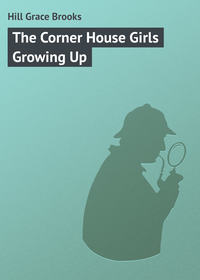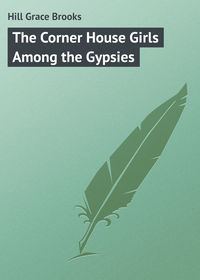 полная версия
полная версияThe Corner House Girls on a Houseboat

Grace Brooks Hill
The Corner House Girls on a Houseboat / How they sailed away, what happened on the voyage, and what was discovered
CHAPTER I – “WHAT’S THAT?”
Delicious and appetizing odors filled the kitchen of the old Corner House. They were wafted even to the attic, were those whiffs and fragrant zephyrs. Some of them even escaped through the open windows, causing Uncle Rufus to cease his slow and laborious task of picking up some papers from the newly cut lawn.
“Dat suah smells mighty good – mighty good!” murmured the old darkey to himself, as he straightened up by the process of putting one hand to the small of his back and pressing there, as though a spring needed adjusting. “Dat suah smells mighty good! Mrs. Mac mus’ suah be out-doin’ of herse’f dish yeah mawnin’!”
He turned his wrinkled face toward the Corner House, again sniffing deeply.
A pleased and satisfied look came over his countenance as the cooking odors emanating from the kitchen became more pronounced.
“Dey’s suah to be some left – dey suah is, ’cause hit’s Miss Ruth’s party, an’ she’s always gen’rus wif de eatin’s. She suah is. Dey’s suah to be some left.”
He removed his hand from the small of his back, thereby allowing himself to fall forward again in the proper position for picking up papers, and went on with his work.
Inside the kitchen, where the odors were even more pronounced, as one might naturally expect to find them, two girls and a pleasant-faced woman were busy; though not more so than a fresh-appearing Finnish maid, who hummed an air full of minor strains as she opened the oven door now and then, thereby letting out more odors which were piled upon, mingled with, and otherwise added to those already bringing such a delicious sensation to Uncle Rufus.
“Aren’t you planning too much, Ruth?” asked her sister Agnes, as the girl addressed carefully placed a wondrously white napkin over a plate of freshly baked macaroons. “I mean the girls will never eat all this,” and she waved her hand to include a side table on which were many more plates, some empty, awaiting their burden from the oven, while others were covered with white linen like some mysterious receptacles under a stage magician’s serviette.
“Oh, don’t worry about that!” laughed Ruth. “My only worry is that I shall not have enough.”
“Well, for the land’s sake! how many do you expect?” demanded Agnes Kenway.
“Six. But there will be you and me and – ”
“Then Mr. Howbridge is coming!” cried Agnes, as if there had been some question about it, though this was the first time his name had been mentioned that morning.
“He may come,” answered Ruth quietly.
“He may! Oh my stars! As if you didn’t know he was coming!” retorted Agnes. “Is it in – er – his official capacity?”
“I asked Mr. Howbridge to come to advise us about forming the society,” Ruth said. “I thought it best to start right. If we are going to be of any use as a Civic Betterment Club in Milton we must be on a firm foundation, and – ”
“Hear! Hear!” interrupted Agnes, banging on the table with an agate mixing spoon, and thereby bringing from a deep pantry the form and face of Mrs. MacCall, the sturdy Scotch housekeeper.
“Please don’t do that!” begged Ruth.
“Hoots! Whut’s meanin’ wi’ the rattlin’ an’ thumpin’?” demanded Mrs. MacCall.
“Oh, some nonsense of Agnes’,” answered Ruth. “I was just telling her that I had asked the girls to luncheon, to talk over the new Civic Betterment Club, and that Mr. Howbridge is coming to advise us how to get a charter, or incorporate, or whatever is proper and – ”
“I was only applauding after the fashion in the English Parliament,” interrupted Agnes. “They always say ‘Hear! Hear!’ away down in their throats.”
“Well, they don’t bang on tables with granite spoons,” retorted Ruth, as she handed a pie to Linda, the humming Finnish maid, who popped it into the oven, quickly shutting the door, to allow none of the heat to escape.
“Hoot! I would not put it past ’em, I would not!” murmured Mrs. MacCall. “What those English law makers do – I wouldna’ put it past them!” and, shaking her head, she retired into the deep pantry again.
“Well, you’re going to have enough of sweets, I should say;” observed Agnes, “even as fond as Mr. Howbridge is of them. For the land’s sake, aren’t you going to stop?” she demanded, as Ruth poured into a dish the cake batter she had begun to stir as soon as the pie was completed.
“This is the last. You don’t need to stay and help me any longer if you don’t want to, dear. Run out and play,” urged Ruth sweetly.
“Run out and play! As if I were Dot or Tess! I like that! Why, I was thinking of asking you to let me join the society!”
“Oh, of course you may, Agnes! I didn’t think you’d care for it. Why, certainly you may join! We want to get as many into it as we can. Do come to the meeting this afternoon. Mr. Howbridge is going to explain everything, and I thought we might as well make it a little social affair. It was very good of you to help me with the baking.”
“Oh, I like that. And I believe I will come to the meeting. Now shall we clean up?”
“I do him,” interposed Linda. “I wash him all up,” and a sweep of her muscular arm indicated the pots, pans, dishes and all the odds and ends left from the rather wholesale baking.
“Oh, I shall be so glad if you will!” exclaimed Ruth. “I want to go over the parlor and library again. And I wonder what has become of Dot and Tess. I asked them to get me some wild flowers, but they have been gone over an hour and – ”
The voice of Mrs. MacCall from the deep pantry interrupted.
“Hi, Tess! Hi, Dot!” she called. “Where ha’ ye been? Come ye here the noo, and be for me waukrife minnie.”
“What in the world does she mean?” asked Agnes, for sometimes, well versed as she was in the Scotch of the housekeeper, there were new words and phrases that needed translating. Especially as it seemed to the girls that more and more Mrs. MacCall was falling back into her childhood speech as she grew older – a speech she had dropped during her younger life except in moments of excitement.
This time, however, it was beyond even the “ken” of Ruth, who rather prided herself on her Highland knowledge. But Mrs. MacCall herself had heard the question. Out she came from the pantry, smiling broadly.
“Ye no ken ‘waukrife minnie’?” she asked. “Ah, ’tis a pretty little verse o’ Rabbie Burns. I’ll call it o’er the noo.”
Then she gave them, with all the burring of which her tongue was capable:
“Whare are you gaun, my bonnie lass, Whare are you gaun, my hinnie? She answered me right saucilie, An errand for my minnie.”Coming down to earth again, Mrs. MacCall shot back into the pantry and from an open window in the rear that looked out in the orchard she called:
“Hi, Tess! Hi, Dot! Come ye here, and be for me the lassies that’ll gang to the store.”
“Are Tess and Dot there?” asked Ruth. “I’ve been wondering where they had disappeared to.”
“They be coming the noo,” answered Mrs. MacCall. “Laden in their arms wi’ all sorts of the trash.” And then she sang again:
“O fare thee well, my bonnie lass, O fare thee well, my hinnie! Thou art a gay an’ a bonnie lass, But thou has a waukrife minnie.”“What in the world is a ‘waukrife minnie’?” asked Agnes, but there was no chance to answer, for in the kitchen, making it more busy than ever, trooped the two younger members of the Corner House girls quartette – Tess and Dot.
Their arms were filled with blossoms of the woods and fields, and without more ado they tossed them to a cleared place on the table, whence Linda had removed some of the pans and dishes.
“Oh, what a lovely lot of flowers!” cried Ruth. “It’s just darling of you to get them for me. Now do you want to help me put them into vases in the library?”
Dot shook her head.
“Why not?” asked Ruth gently.
“I promised my Alice-doll to take her down by the brook, and I just have to do it,” answered Dot. “And Tess is going to help me; aren’t you, Tess?” she added.
“Yes,” was the answer. “I’m going to take Almira.”
“Then you must take her kittens, too!” insisted Dot. “She’ll feel bad if you don’t.”
“I won’t take ’em all – I’ll take one kitten,” compromised Tess. “There she is, now!” And Tess darted from the room to pounce on the cat, which did not seem to mind very much being mauled by the children.
“Will ye gang a’wa’ to the store the noo?” asked Mrs. MacCall, with a warm smile as she came from the pantry. “There’s muckle we need an’ – ”
“I’ll go if you give me a cookie,” promised Dot.
“So’ll I,” chimed in Tess, coming in on the tribute. “We can take Almira and your Alice-doll when we come back,” she confided to her sister.
“Yes, I think they’ll wait. I know Alice-doll will, but I’m not so sure about Almira,” and Dot seemed rather in doubt. “She may take a notion to carry her kittens up in the bedroom – ”
“Don’t dare suggest such a thing!” cried Ruth.
“I’m to have company this afternoon, and if that cat and her kittens appear on the scene – ”
“Oh, I wasn’t going to carry them in!” interrupted Dot, with an air of injured innocence. “They’re Almira’s kittens, and she can do what she likes with them, I suppose,” she added as an afterthought. “Only I know that every once in a while she takes a notion to plant them in a new place. Once Uncle Rufus found them in his rubber boots, and they scratched him like anything when he put his foot inside.”
“Well, if you have to go to the store for Mrs. MacCall you won’t have any time to help me arrange the flowers,” observed Ruth, anxious to put an end to the discussion about the family cat and kittens, for she knew Dot had a fund of stories concerning them.
“Yes, traipse along now, my bonnie bairns,” advised the Scotch housekeeper, and, bribed by two cookies each, a special good measure on Saturday, Dot and Tess were soon on their way, or at least it was so supposed.
Linda was helping Mrs. MacCall clear away the baking utensils, and Ruth and Agnes were in the parlor and library, tastefully arranging the wild flowers that Dot and Tess had gathered.
“Isn’t Dot queer to cling still to her dolls?” remarked Agnes, as she stepped back to get the effect of a bunch of red flowers against a dark brown background in one corner of the room.
“Yes, she is a strange child. And poor Almira! Really I don’t see how that cat stands it here, the way Tess and Dot maul her.”
“They aren’t as bad as Sammy Pinkney. Actually I caught him yesterday tying the poor creature to the back of Billy Bumps!”
“Not on the goat’s back!” cried Ruth.
“Really, he was. I sent him flying, though!”
“What was his idea?”
“Oh, he said he’d heard Neale tell how, in a circus, a little dog rode on a pony’s back and Sammy didn’t see why a cat couldn’t ride on a goat.”
“Well, if he put it that way I suppose she could,” assented Ruth. “But Almira seems to take herself very seriously with all those kittens. We really must get rid of them. Vacation will soon be here, and with Tess and Dot around the house all day, instead of just Saturdays, I don’t know what we shall do.”
“Have you made any vacation plans at all?”
“Not yet, Agnes. I thought I’d wait until I saw Mr. Howbridge at the club meeting this afternoon.”
“What has he to do with our vacation – unless he’s going along?”
“Oh, no, I didn’t mean that, at all! But the financial question does enter into it; and as he is our guardian and has charge of our money, I want to know just how much we can count on spending.”
“Why, have we lost any money?”
“Not that I know of. I hope not! But I always have consulted him before we made any summer plans, and I don’t see why we should not now.”
“Well, I suppose it’s all right,” assented Agnes, as she took up another bunch of flowers. “But I wonder – ”
She never finished that sentence. From somewhere, inside or outside the house, a resounding crash sounded. It shook the walls and floors.
“Oh, my! what’s that?” cried Ruth, dropping the blossoms from her hands and hastening to the hall.
CHAPTER II – NEALE HAS NEWS
Deep, and perhaps portentous, silence had succeeded the crash. But both Ruth and Agnes knew enough of the goings and comings in the Corner House not to take this silence for serenity. It meant something, as the crash had.
“What was it?” murmured Ruth again, and she fairly ran out into the hall, followed by her sister.
Then came a series of bumps, as if something of no small size was rolling down the porch steps. By this time it was evident that the racket came from without and not from within. Then a voice cried:
“Hold it! Hold it! Don’t let it roll down!”
“That’s Dot!” declared Ruth.
And then a despairing voice cried:
“I can’t! I can’t hold it! Look out!”
Once again the rumbling, rolling, bumping sound came, and with it was mingled the warning of the Scotch housekeeper and the wail of Dot who cried:
“Oh, she’s dead! She’s smashed!”
“Something really has happened this time!” exclaimed Ruth, and her face became a little pale.
“If only it isn’t serious,” burst out Agnes. “Oh, dear, what those youngsters don’t think of for trouble!”
“They don’t mean to get into trouble, Agnes. It’s only their thoughtlessness.”
“Well then, they ought to think more. Oh, listen to that, will you!” Agnes added, as another loud bumping reached the two sisters’ ears.
“It’s something that’s sure,” cried Ruth, and grew paler than ever.
The happening was not really as tragic as it seemed, yet it was sufficiently momentous to cause a fright to the two older girls. Especially to Ruth, who felt herself to be, as she literally was, a mother to the other three; though now that Agnes was putting up her hair and putting down her dresses a new element had come into the household.
While yet in tender years the responsibilities of life had fallen on the shoulders of Ruth Kenway. In their former home – a city more pretentious in many ways than picturesque Milton, their present home – the Kenways had lived in what, literally, was a tenement house. Their father and mother were dead, and the small pension granted Mr. Kenway, who had been a soldier in the Spanish war, was hardly sufficient for the needs of four growing girls.
Then, almost providentially, it seemed, the Stower estate had come to Ruth, Agnes, Dot and Tess. Uncle Peter Stower had passed away, and Mr. Howbridge, the administrator of the estate, had discovered the four sisters as the next of kin, to use his legal phrase.
Uncle Peter Stower had lived for years in the “Corner House” as it was called. The mansion stood opposite the Parade Ground in Milton, and there Uncle Rufus, the colored servant of his crabbed master, had spent so many years that he regarded himself as a fixture – as much so as the roof.
At first no will could be found, though Mr. Howbridge recalled having drawn one; but eventually all legal tangles were straightened out, and the four sisters came to live in Milton, as related in the first book of the series, entitled “The Corner House Girls.”
There was Ruth, the oldest and the “little mother,” though she was not so very little now. In fact she had blossomed into a young lady, a fact of which Mr. Howbridge became increasingly aware each day.
So the four girls had come to live at the Corner House, and that was only the beginning of their adventures. In successive volumes are related the happenings when they went to school, when they had a jolly time under canvas, and when they took part in a school play.
The odd find made in the garret of the Corner House furnished material for a book in itself and paved the way for a rather remarkable tour in an auto.
In those days the Corner House girls became acquainted with a brother and sister, Luke and Cecile Shepard. Luke was a college youth, and the friendship between him and Ruth presently ripened into a deep regard for each other. But Luke had to go back to college, so Ruth saw very little of him, though the young folks corresponded freely.
All this was while the Corner House girls were “growing up.” In fact, it became necessary to tell of that in detail, so that the reason for many things that happened in the book immediately preceding this, which is called “The Corner House Girls Snowbound,” could be understood.
In that volume the Corner House girls become involved in the mysterious disappearance of two small twins, and after many exciting days spent in the vicinity of a lumber camp a clue to the mystery was hit upon.
But now the memory of the blizzard days spent in the old Lodge were forgotten. For summer had come, bringing with it new problems, not the least of which was to find a place where vacation days might be spent.
Ruth proposed to speak of that when her guardian called this Saturday afternoon. As she had hinted to Agnes, Ruth had invited a number of girl friends to luncheon. It was the plan to form a sort of young people’s Civic Club, to take up several town matters, and Ruth was the moving spirit in this, for she loved to work toward some definite end.
This Saturday was no exception in being a busy one at the Corner House.
In pursuance of her plans she had enlisted the whole household in preparing for the event, from Mrs. MacCall, who looked after matters in general, Linda, who helped with the baking, Uncle Rufus, who was cleaning the lawn, down to Dot and Tess, who had been sent for flowers.
And then had come the bribing of Dot and Tess to go to the store and, following that, the crash.
“What can it be?” murmured Ruth, as she and Agnes hastened on. “Some one surely must be hurt.”
“I hope not,” half whispered Agnes.
From the side porch came the sound of childish anguish.
“She’s all flatted out, that’s what she is! She’s all flatted out, my Alice-doll is, and it’s all your fault, Tess Kenway! Why didn’t you hold the barrel?”
“I couldn’t, I told you! It just rolled and it rolled. It’s a good thing it didn’t roll on Almira!”
“Gracious! did you hear that?” cried Agnes. “What can they have been doing?”
The two older sisters reached the porch together, there to find Mrs. MacCall holding to Tess, whom she was brushing off and murmuring to in a low voice, filled with much Scotch burring.
Dot stood at the foot of the steps holding a rather crushed doll out at arm’s length, for all who would to view. And stalking off over the lawn was Almira, the cat, carrying in her mouth a wee kitten. Uncle Rufus was hobbling toward the scene of the excitement as fast as his rheumatism would allow. Scattered on the ground at the foot of the steps was a collection of odds and ends – “trash” Uncle Rufus called it. The trash had come from an overturned barrel, and it was this barrel rolling down the steps and off the porch that had caused the noise.
“What happened?” demanded Ruth, breathing more easily when she saw that the casualty list was confined to the doll.
“It was Tess,” declared Dot. “She tipped the barrel over and it rolled on my Alice-doll and now look at her.”
Dot referred to the doll, not to her sister, though Tess was rather a sight, for she was covered with feathers from an old pillow that had been thrown into the barrel and had burst open during the progress of the accident.
At first Tess had been rather inclined to cry, but finding, to her great relief, that she was unhurt, she changed her threatened tears into laughter and said:
“Ain’t I funny looking? Just like a duck!”
“What were you trying to do, children?” asked Ruth, trying to speak rather severely in her capacity as “mother.”
“I was trying to put Almira and one of her kittens into the barrel,” explained Tess, now that Mrs. MacCall had got off most of the feathers. “I leaned over to put Almira in the barrel, soft and easy like, down on the other pillow, and it upset – I mean the barrel did. It began to roll, and I couldn’t stop it and it rolled right off the porch and – ”
“Right over my Alice-doll it rolled, and she’s all squashed!” voiced Dot.
“Oh, be quiet! She isn’t hurt a bit,” cried Tess. “Her nose was flat, anyhow.”
“Did the barrel roll over you?” asked Agnes, smiling now.
“Almost,” said Tess. “But I got out of the way in time, and Almira grabbed up her kitten and ran. Where is she?” she asked.
“Never mind the cat,” advised Ruth. “She’s caused enough excitement for one Saturday morning. Why were you putting her in the barrel, anyhow, Tess?”
“So I’d know where she was when I came back. I wanted her and one kitten to play with if Dot is going to play with her Alice-doll when we get back from the store. But I guess I leaned too far over.”
“I guess you did,” assented Ruth. “Well, I’m glad it was no worse. Is your doll much damaged, Dot?”
“Maybe I can put a little more sawdust or some rags in her and stuff her out. But she’s awful flat. And look at her nose!”
“Her nose was flat, anyhow, before the barrel rolled over her,” said Tess. “But I’m sorry it happened. I guess Almira was scared.”
“We were all frightened,” said Ruth. “It was a terrible racket. Now let the poor cat alone, and run along to the store. Oh, what a mess this is,” and she looked at the refuse scattered from the trash barrel. “And just when I want things to look nice for the girls. It always seems to happen that way!”
Uncle Rufus shuffled along.
“Doan you-all worry now, honey,” he said, speaking to all the girls as one. “I’ll clean up dish yeah trash in no time. I done got de lawn like a billiard table, an’ I’ll pick up dish yeah trash. De ash man ought to have been along early dis mawnin’ fo’ to get it. I set it dar fo’ him.”
That explained the presence on the side porch of the barrel of odds and ends collected for the ash man to remove. He had not called, and seeing the receptacle there, with an old feather pillow among the other refuse, Tess thought she had her opportunity.
“Run along now, my bonny bairns! Run along!” counseled the old Scotch woman. “’Tis late it’s getting, and the lassies will be here to lunch before we know it.”
“Yes, do run along,” begged Ruth. “And then come back to be washed and have your hair combed. I want you to look nice if, accidentally, you appear on the scene.”
Thus bidden, and fortified with another cookie each, Tess and Dot hurried on to the store, Dot tenderly trying to pinch into shape the flattened nose of her Alice-doll.
Rufus got a broom and began to clean the scattered trash to put back into the barrel, and Mrs. MacCall hurried into her kitchen, where Linda was humming a Finnish song as she clattered amid the pots and pans.
“Oh, we must finish the parlor and library,” declared Ruth. “Do come and help, Agnes.”
“Coming, Ruth. Oh, here’s Neale!” she added, pausing to look toward the gate through which at that moment appeared a sturdy lad of pleasant countenance.
“He acts as though he had something on his mind,” went on Agnes, as the youth broke into a run on seeing her and her sister on the steps. “Wait a moment, Ruth. He may have something to tell us.”
“The fates forbid that it is anything more about Tess and Dot!” murmured Ruth, for the children had some minutes before disappeared down the street.
“News!” cried Neale O’Neil, as he swung up the steps. “I’ve got such news for you! Oh, it’s great!” and his face fairly shone.
CHAPTER III – THE ELEVATOR
“Just a minute now, Neale,” said Ruth, in the quiet voice she sometimes had to use when Tess and Dot, either or both, were engaged in one of their many startling feats. “Quiet down a bit, please, before you tell us.”
The boy had reached the porch, panting from his run, and he had been about to burst out with the news, which he could hardly contain, when Ruth addressed him.
“What’s the matter? Don’t you want to hear it?” he asked, fanning himself vigorously with his hat.
“Oh, yes, it isn’t that,” said Agnes, with a smile, which caused Neale’s lips to part in an answering one, showing his white teeth that made a contrast to his tanned face. “But we have just passed through rather a strenuous time, Neale, and if you have anything more startling to tell us about Tess and Dot – ”
“Oh, it isn’t about them!” laughed Neale O’Neil. “They’re all right. I just saw them going down the street.”









